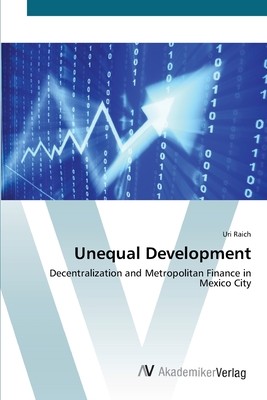
- We will send in 10–14 business days.
- Author: Uri Raich
- Publisher: AV Akademikerverlag
- ISBN-10: 3639454219
- ISBN-13: 9783639454215
- Format: 15.2 x 22.9 x 1.4 cm, softcover
- Language: English
- SAVE -10% with code: EXTRA
Reviews
Description
Revision with unchanged content. Studies of fiscal decentralization have largely centered on the formal tiers of government, without looking at the effects of this process on the recipient jurisdictions in metropolitan areas. This is an important omission, considering that more than 50 percent of the world's population lives in urban areas that often extend beyond formal jurisdictional boundaries. As a response, this study explores the impacts of fiscal decentralization in metropolitan areas. It does so by testing the hypothesis that the policies of fiscal decentralization in Mexico have exacerbated the level of fiscal disparity of the Metropolitan Zone of the Valley of Mexico (ZMVM). The results show that fiscal disparity in the ZMVM increased during the 1990s. Despite State intervention through a system of redistributive transfers, the increase in fiscal disparities was due to three primary factors: the indirect effect of transfers on local fiscal effort, the uneven distribution of services and infrastructure in the metropolitan space, and differing governance structures in the ZMVM's jurisdictions. To mitigate such disparities the study explores the creation of a metropolitan fund and the formation of a special authority for the transportation sector. This book is addressed to academics and practitioners interested in bringing a spatial dimension to the study of decentralization and public finances.
EXTRA 10 % discount with code: EXTRA
The promotion ends in 20d.09:37:00
The discount code is valid when purchasing from 10 €. Discounts do not stack.
- Author: Uri Raich
- Publisher: AV Akademikerverlag
- ISBN-10: 3639454219
- ISBN-13: 9783639454215
- Format: 15.2 x 22.9 x 1.4 cm, softcover
- Language: English English
Revision with unchanged content. Studies of fiscal decentralization have largely centered on the formal tiers of government, without looking at the effects of this process on the recipient jurisdictions in metropolitan areas. This is an important omission, considering that more than 50 percent of the world's population lives in urban areas that often extend beyond formal jurisdictional boundaries. As a response, this study explores the impacts of fiscal decentralization in metropolitan areas. It does so by testing the hypothesis that the policies of fiscal decentralization in Mexico have exacerbated the level of fiscal disparity of the Metropolitan Zone of the Valley of Mexico (ZMVM). The results show that fiscal disparity in the ZMVM increased during the 1990s. Despite State intervention through a system of redistributive transfers, the increase in fiscal disparities was due to three primary factors: the indirect effect of transfers on local fiscal effort, the uneven distribution of services and infrastructure in the metropolitan space, and differing governance structures in the ZMVM's jurisdictions. To mitigate such disparities the study explores the creation of a metropolitan fund and the formation of a special authority for the transportation sector. This book is addressed to academics and practitioners interested in bringing a spatial dimension to the study of decentralization and public finances.


Reviews